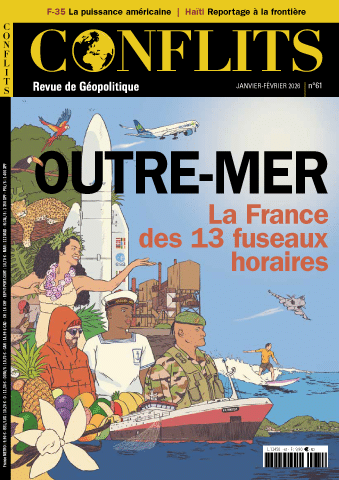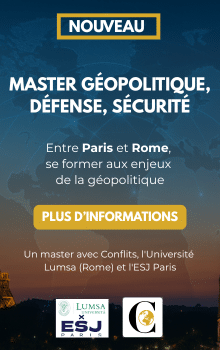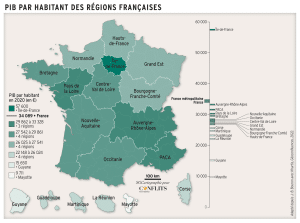Populists see their salvation in the State and tariffs. Libertarians want to dismantle the State and grant primacy to the individual. Two seemingly contradictory currents that nevertheless form political and electoral alliances.
Article published in Issue N59 Droite. La nouvelle internationale ?
Jérôme Perrier, an alumnus of the École Normale Supérieure, agrégé and PhD in history from Sciences Po Paris, is the author of two papers published by Fondapol in April 2025 under the title “The Populist Hijacking of the Libertarian Current.”
One of the most striking ideological phenomena of recent years, worldwide, is the improbable alliance between libertarian ideas—meant to promote radical freedom in all spheres of social life—and a clever blend of authoritarian and populist political principles, not to mention overtly conservative cultural values.
This unstable alloy is notably embodied by political entrepreneurs who seemed to appear out of nowhere, such as Argentine President Javier Milei, or tech entrepreneur Elon Musk, briefly allied with Donald Trump in a two-pronged crusade: against federal government spending (in the anarcho-capitalist logic of “always less State”), and against the “woke dictatorship” (in a reactionary vein utterly opposed to any form of liberalism). The case of Donald Trump himself is different insofar as the American president is as little a man of ideas and theory as he is a man of image and media. What’s more, the only area where Trump has remained consistent for decades is his visceral aversion to free trade and his neo-mercantilist vision of the economy. Thus, for the man who considers “tariff” the most beautiful word in the English language, economic thought is promoted in a way utterly incompatible with libertarian principles, even at the cost of the most extreme contortions.
The most interesting case for studying this “libertaro-populist” current is certainly that of Argentine President Javier Milei who, unlike Trump (or even Musk), has an extremely structured ideology, nourished by robust theoretical readings. This economist by profession, who long taught at university, can combine incendiary rhetoric and vulgar vocabulary with perfectly structured ideas stemming from long-term reflection. This is what we tried to demonstrate in two papers published in April 2025 by Fondapol.
Understanding the Ideological Mutation
To better grasp such a wide-scale ideological shift, and the paradoxes posed by this unnatural alliance between libertarian water and populist fire, it is necessary to sketch its genesis before showing how this ideological oxymoron violates several cardinal principles of liberalism, to which some still claim allegiance through its most radical avatar, anarcho-capitalism.
It was a dozen years ago, in 2013, after devouring an article by American economist Murray N. Rothbard (1926–1995), that Javier Milei experienced what can rightly be called a revelation. The text in question, from a chapter of the massive theoretical treatise Man, Economy, and State (1962), sought to rehabilitate monopolies (so long as they were not public ones), thereby contravening a principle that had long commanded near-unanimous agreement among economists, including the most liberal. Following this sudden illumination, Milei plunged headlong into the vast libertarian literature from the United States, and the young convert resolved with zeal to spread the anarcho-capitalist light against the statophile obscurantism that now seemed to him to dominate academia and the broader political debate. Determined to preach the good word by all available means, the academic traded his gown for the microphone, throwing himself into media appearances (notably on radio and television) with a frenzy and verbal violence far removed from the academic propriety he had until then largely observed.
The libertarian ideas to which Milei converted in the mid-2010s have deep ideological roots traceable back to 19th-century Europe—including, curiously from today’s perspective, France. Indeed, Rothbard, the man responsible for Milei’s conversion, was an ardent admirer of the “French laissez-faire school” and some of its leading figures, such as Frédéric Bastiat (1801–1850). This is abundantly attested by his last book, published in 1995, the year of his death: An Austrian Perspective on the History of Economic Thought. Nonetheless, libertarian or anarcho-capitalist ideas (the terms may be taken as synonyms) are above all an American import.
It was from the 1960s onwards that this ideological nebula developed in the United States. Rather than a perfectly structured movement adhering to a fixed doctrinal line, it is more accurate to describe a galaxy within which several currents of thought can be distinguished. Its most moderate wing is an offshoot of classical liberalism and includes such well-known figures as Nobel laureates Friedrich Hayek (1974) and Milton Friedman (1976). Both taught at the University of Chicago’s prestigious economics department and consistently advocated a modest State reduced to its sovereign functions. These liberals may thus be associated with the minarchist current, given philosophical grounding in Robert Nozick’s celebrated Anarchy, State, and Utopia (1974), and an economic foundation in the work of Austrian economist Ludwig von Mises. Hayek’s former mentor, exiled to the United States in 1940, never obtained a prominent academic position, but nonetheless played a decisive role in the rise of libertarianism across the Atlantic, notably through his most extreme disciples, beginning with Rothbard who, while radicalizing his mentor’s positions, never missed an opportunity to pay him homage. Rothbard would indeed prove the key actor in pushing liberal ideas toward hardline anarcho-capitalism—that is, from advocating a minimal State to promoting the capitalist utopia of a stateless world. He would also play a decisive role after the 1970s in forging a strategic alliance between libertarians and the most conservative right.
Indeed, after the Vietnam War, which saw passionately anti-interventionist American anarcho-capitalists draw closer to the radical libertarian left, the following decade marked a crucial moment in libertarian history with the emergence of a highly improbable alliance with the Old Right, the religious right, fiercely conservative. The mastermind of this 180-degree turn was none other than Rothbard himself, who christened this new strategy “fusionism.” In other words, the theoretically daring amalgam of what came to be known as “paleo-libertarians” and right-wing “paleo-conservatives.” This Christian right was reactionary on cultural issues (increasingly focused on abortion), isolationist in foreign policy (in keeping with a strong American tradition, particularly vivid within the Republican Party), and in favor of dismantling the welfare state to the great benefit of the wealthy, naturally seduced by a radically anti-tax discourse. This right, which Rothbard himself labeled “populist,” also openly sought to dismantle the anti-segregationist and anti-discrimination framework instituted during the 1960s at the height of the civil rights struggle.
The Unlikely Fusion
The author of Man, Economy, and State was not the only actor in this odd alliance, but he was indisputably its dominant figure and, above all, its chief theorist. He wore a dual hat not so common in the American intellectual sphere: both an economic theorist (though always marginal in academia, teaching mostly at Brooklyn Polytechnic before ending his career at the University of Nevada, Las Vegas) and a committed intellectual and shrewd political tactician. Rothbard ultimately occupied a central place in structuring anarcho-capitalist activism, born of the radicalization of Austrian school economics. In his fight against the State hydra (his lifelong guiding star), Rothbard drew inspiration from both Gramsci and Lenin, with an explicit will to conquer the masses—specifically, white middle classes susceptible to a Manichean discourse that made State officials the perfect scapegoat for all America’s ills. In this scapegoat quest, he also drew inspiration from the Nazi Party’s power strategy in 1930s Germany.
Anyone rereading today Rothbard’s countless writings from the late 1970s until his death in 1995 cannot fail to be struck by how much of the populist program of figures like Javier Milei (and even Trump) was virtually prefigured there, sometimes down to the comma. Already present were denunciations of what they called the new ecological creed—even though climate change was then just one among many targets of libertarians’ anti-regulatory rhetoric on environmental issues. Already present was outright condemnation of various public health imperatives, with the recurring denunciation of anti-tobacco campaigns in the 1980s–1990s foreshadowing their identical attacks on vaccines in the Covid era. Already present, too, was the war on “wokeism”—though, of course, the term did not yet exist. The rhetoric, however, was identical: Rothbard and his allies constantly denounced the legislative itch promoting multiculturalism while railing against supposed racial and gender “discriminations” designed to feed the insatiable regulatory and coercive appetite of the State Leviathan. As today, the drive to dismantle this anti-discrimination legislation sheltered under the banner of freedom of expression, condemning a reversed moral order that sought to stigmatize and incriminate the defenders of traditional conservative values in the name of what only lacked the label “woke.”
“An anti-tax consensus is no substitute for a political program.”
The brief genesis of this ideological drift leaves open the question of whether these libertaro-populists still have anything to do with liberalism, or whether their alliance of convenience with the conservative right has come at the cost of betraying some of the principles claimed for more than two centuries by the diverse currents of liberal thought. To answer this, it is necessary—difficult though it may be—to define, if not liberalism itself (some doubt whether such a thing exists), then at least the conceptual framework within which claiming that heritage remains coherent. One way is to define a sort of ideal type of the liberal philosophical core, found in pure form in canonical authors such as Britain’s John Stuart Mill or France’s Benjamin Constant. The latter, for example, sought to defend “freedom in everything—in religion, philosophy, literature, industry, politics”—perhaps the most concise formula approaching liberalism’s essence. Following this logic, a coherent liberal framework should be at once political, economic, and cultural, aimed at defending individual rights against all forms of domination—whether political (a liberal despotism is a pure contradiction), cultural (liberalism is incompatible with any form of ideological or religious monopoly), or economic (Big Business can be perfectly illiberal when it eliminates competition).
Returning to Liberal Principles
Once established that any coherent liberalism aims to guarantee individual rights against all threats of domination, it is easy to demonstrate that libertarians (especially when allied with populist right-wingers) have betrayed some of liberalism’s fundamental principles. A few examples suffice.
Can one, on the one hand, demand total freedom of expression and, on the other, wage war on academic freedom by banning research labeled as “woke,” even prohibiting the very use of certain terms? Can one reject vaccine mandates or even sanitary confinement in the name of absolute ownership of one’s body (and thus health), while simultaneously seeking to ban abortion? Can one denounce all public monopolies in the name of freedom of enterprise, yet see no issue with monopolies when they are private? Can one reject all State coercion in the name of individual sovereignty, yet simultaneously approve migration policies restricting freedom of movement—a right identified as fundamental by liberal tradition for more than two centuries? Can one defend freedom of conscience and demand absolute freedom of expression, while simultaneously condemning same-sex marriage for no other reason than religious dogma claiming the right to dictate how everyone should live?
Examples could be multiplied endlessly. It is obvious that the libertaro-populist alliance is a coalition of convenience meant to silence contradictions in the name of opportunistic and cynical strategy. It is no coincidence that one of the major disagreements between Elon Musk (a libertarian by fits and starts) and Donald Trump (a populist through and through) has been the latter’s neo-mercantilist trade policy. In fact, this issue is merely the tree hiding the forest of glaring contradictions between libertarian and populist logics, which are perfectly antithetical. That is why the rift between the real estate magnate turned president and the tech billionaire turned anti-State and anti-woke crusader goes far beyond anecdote, delivering a political lesson that transcends the American case. This rupture is irrefutable proof that the libertaro-populist synthesis is inevitably doomed to failure, since political physics has laws that cannot be permanently defied. For while oxymoron is a well-known rhetorical device, it cannot be elevated to a principle of government.
- https://www.fondapol.org/etude/le-detournement-populiste-du-courant-libertarien/
- See also our first volume: “Le détournement populiste du courant libertarien. (1) Des origines de l’anarcho-capitalisme au populisme de droite”, pp. 52–56.











